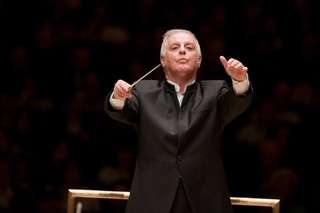|
Back
Wien, Wien! New York
Carnegie Hall
01/15/2010 -
Ludwig van Beethoven: Symphony No. 6 “Pastoral”, op. 68
Richard Wagner: Prelude and Liebestod from “Tristan und Isolde”
Arnold Schoenberg: Variations for Orchestra, op. 31
Vienna Philharmonic
Daniel Barenboim (conductor) 
D. Barenboim
Oddly after eighty years, it is still not generally understood that Schoenberg’s development of the dodecaphonic system was a nod towards traditionalism, a counter-reformation to the perceived anarchy of pantonality. In the Variations for Orchestra, performed on Friday evening at Carnegie Hall, the master craftsman fashions a tightly knit, cohesive unit with not only a unifying tone row, but also a recognizable motto. This construction, close in architecture to the Baroque variation suite, does not trumpet that motto – the notes B (German B flat) A C H (German B) – until the final moments. Always the iconoclast, the composer hums along nicely in a quasi-tonal manner (Robert Craft talks about how his California teacher used to harmonize the piece in standard language just to demonstrate how mainstream it actually was) until the final chord, a shocking dissonance to ultimately unsettle the listener.
Of course, the Vienna Philharmonic, like all good European ensembles, performs encores on a regular basis, so the equation was a bit skewed, but an interesting sidelight to this affair was that the announced program changed three different times from original brochure to actual event. Programming the Schoenberg last after Beethoven and Wagner kindled thoughts of a mass exodus. Would anyone actually walk out?
Of course. About one hundred patrons left before the music started and another couple of dozen – much more egregiously – during the performance. Nothing would be more delicious than to state that they missed a superb performance, but, alas, this was not the case. Daniel Barenboim led a clean and crisp reading, but did not bring out the emotional content of the work, even during the normally viscerally exciting sections with pounding percussion and exotic mallet instruments. Still, one must feel thankful that this music is still performed occasionally. It is, after all, as much a part of the Viennese tradition as the pedigrees of the members of this hothouse environment orchestra itself.
Speaking of which, there are no words in English – or German for that matter – to express the loveliness and silkiness of this uniquely cultivated ensemble. The concert opened with the “Pastoral” and any given moment of this execution was quite thrilling from a purely sonic perspective. However, Mr. Barenboim presented a rather Baroque-inspired version, the storm no more febrile than the other movements. Pleasant but unmemorable.
The best performance of the evening was the Wagner, that odd juxtaposition of orchestral excerpts that compresses five hours of passion into fifteen minutes. I would have wished for broad gestures, bigger climaxes, but this is but a cavil.
There was indeed at least one great musician in the hall this evening, although not on the stage. Yefim Bronfman came just to enjoy the music and did not walk out when the Schoenberg began.
Fred Kirshnit
|